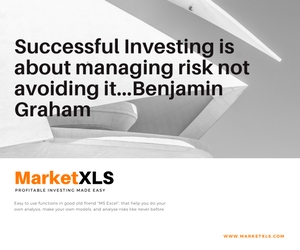Every investor wishes he had a crystal ball. Many talking heads on CNBC get paid big money to pretend that they do have a magical ability to predict the future. But none of us do.
That being said, many of the most successful investors have earned their fortunes by identifying a trend early, and riding the wave to victory. In the world of healthcare investing, understanding changes in both medicine and the market are critical to gaining that small edge which eventually means big profit. Change is the only constant in life; let’s learn how to leverage that change to our advantage.
Here are a few big changes sweeping through the world of healthcare investing. We are trying to ignore fads, and focus on the lasting shifts that will drive earnings and investment returns for 2019 and beyond. We will also list brand name stocks that are affected by these trends.
1. ENTER BEZOS; DESTROYER OF WORLDS.
Not since Paul Revere’s midnight ride has a more alarming call to arms been issued; forget about the British, let the world know that Amazon is coming!!
After putting a buzzsaw to the Establishment in publications, media, gifts, data, groceries and every other American business, The Beez is finally coming for healthcare. The clues trickled in throughout 2018, and now it has become apparent that we can expect Amazon to muscle into various healthcare sectors in 2019. Why would Amazon be interested in a highly regulated, highly specialized, mind numbingly complex business like healthcare?
Endless growth.
As we have discussed ad nauseum in this blog, 10,000 Americans per day get Medicare cards. Most of these people have another twenty years of life ahead of them, which will add up to thousands of doctor’s visits. Total healthcare spending is now $35 Trillion with a T, and only growing. Even if Bezos gets his sticky little fingers into just two or three percent market share, the potential for new revenue is mind boggling.
Amazon already has several core competencies that can be adapted to attack healthcare markets. One of Amazon’s chief accomplishments is a razor sharp logistical acumen with vast resources dedicated to acquiring, storing and shipping goods at a moment’s notice. This can easily be adapted to the medical supply business and pharmaceutical business. Also, Amazon Web Services is a leader in all kinds of cognitive computing. Healthcare is currently generating oceans of data, but no one provider has been able to truly harness the power of that data. Ever wonder why Amazon seems to know more about you than your own siblings? Yeah, data.
Amazon has already sunk billions into developing these capabilities; applying them in as many growing fields as possible only makes sense.
Let’s face it, healthcare sucks. From absurd pharmacy bills, to a Kafkaesque care delivery systems, anyone who has interacted with our current healthcare system would tell you that it is as far from patient friendly as possible. Most current providers, whether they be pharmaceutical, medical records, or pharmacies, have dedicated Herculean efforts to eliminating competition and jacking up prices regardless of value delivered. Amazon has a legendary track record of doing just the opposite. Despite endless rhetoric, most patients feel that their needs and wants come dead last. That is an obvious opportunity for Bezos and company.
A few critical questions remain for investors…
One area where Amazon doesn’t have much experience is working within highly regulated industries. Will moving into the Washington D.C. area allow Amazon to build up the same level of lobbying fire power as Big Pharma and other big medical players?
Right now, Amazon has a smattering of different healthcare startups with minimal internal ties (pharmacy, medical supplies, AI, insurance). Will these continue to be run piece -meal, or will all of these efforts come under the same leadership silo?
Will “Amazon Health” become a thing?
Up until 2018, most incumbent competitors didn’t evolve much, because they didn’t have to. Big medical companies had done a masterful job of stopping competition before it started. There is no wishing Amazon away. If properly motivated, how much resistance could these incumbent players put up? Forced to fight for survival in the new jungle that is Healthcare, will these formerly domesticated animals evolve into fierce competitors? Bezos could be in for a tougher fight than he might imagine…
Stocks Impacted by this Trend: $AMZN, $ESRX, $IBM, $OMI, $MCK, $CAH, $QSII, $MDRX
2. GOING VERTICAL
Perhaps one off the industries most directly in the path of the Amazon juggernaut is the pharmacy industry. After relentlessly eliminating competition for two decades, it now looks very likely that CVS and Walgreens are suddenly going to have to contend with a new kid on the block. A very big, very patient, very nasty kid. Just the thought of this new competition has been a serious depressant on CVS’s formerly high flying stock.
So CEO Larry Merlo decided to do something drastic; this month he has completed his jumbo sized purchase of Aetna insurance company. His goal? Nothing less than changing the narrative on how healthcare is delivered in the United States.
Merlo isn’t alone in his urge to merge. Careful observers have noticed that United Health, America’s largest insurer, has been hovering up private medical practices for years. Humana Inc, another titan of the healthcare business, has also been sucking up medical practices like an alien spaceship with a powerful tractor beam. “Resistance is Futile” seems to be the going refrain…
The main pattern is that very large, very well connected healthcare companies seek to become even larger, and even more well connected, by directly offering care to insured patients. The vision goes something like this; sign up for Aetna insurance, and walk into any one of thousands of CVS locations to get a full medical checkup from an in network doctor. Get your diagnostic work done in the store. At the end of your visit, walk right to the pharmacy counter and walk out with your Rx. CVS gets to utilize it’s valuable real estate better than it currently is, and also can pay employed medical provides less than they would otherwise. You get the convenience of “one stop healthcare shopping,” very likely less than a five minute drive from your house. Sounds reasonable, right?
Before you run out and load up on CVS stock here are a few things to consider…
The Vision is often great, the execution is often terrible. Corporate mega mergers have a long track record as value destroyers, just in general. Getting disparate businesses, with thousands of different executive fiefdoms, to work together effectively can be a world class headache. Sometimes it just doesn’t work out. Remember AOL/Time Warner? Ouch.
This vertical integration was never plan A. It’s plan B (or C) being caused by a combination of stagnation and new competition from Amazon. Both United Health and CVS grew to massive proportions over the years by buying and consolidating all competition. Eventually, they finally ran out of competitors that they could legally buy (CVS finally met its Waterloo when the Feds blocked much of its attempt to purchase Rite-Aid). Shareholders continue to expect double digit growth; these companies’ “go to” strategies finally became exhausted, and they had to come up with something. So they decided to start buying vertical.
The reason why CVS is planning on offering medical services in its stores through Aetna is because Amazon is crushing CVS’s retail business. Only a small percentage of the stores’ space were dedicated to selling drugs. The rest was all about impulse buys and last minute “Oh, I do need that,” retail purchases of cosmetics, junk food, or toilet paper. With Amazon expediting delivery time more and more every day, those retail sales have withered. So, CVS is finding something new to do with it’s massive hoard of well located, convenient stores. It may well work, but remember, this is not how the business was originally designed.
Another example is United Health. While they have added minimal real estate to their holdings, they continue to purchase all kinds of healthcare practices, from outpatient surgery to primary care. This may lower the costs they pay to provide care to the insured patients, and it may give them leverage in constantly contentious negotiations with ever consolidating hospital networks. United has chosen more of a “bolt on” acquisition approach; buying many small businesses and gradually assimilating them into the company, as opposed to the “Big Bang” that CVS is attempting. This may well wind up being the more wise approach.
These kinds of mergers should continue, as the big just get bigger.
Stocks Impacted by this Trend: $CVS, $WBA, $UNH, $HUM, $WMT, $HCA, $CI.
3. WINNING THE WAR ON CANCER
This trend is one of the brightest lights of 2019, and yet another great reason why we can feel proud of our healthcare investment portfolio.
Anyone of a certain age can remember when the government was really into declaring “War” on certain intangible, intractable social problems. Richard Nixon’s “War on Cancer,” and Ronald Reagan’s “War on Drugs,” jump to mind. Us 80’s kids can also tell you that, if we were were at war with Cancer, we were getting slaughtered in the trenches.
Until lately, Cancer treatment consisted of a range of terrible options. Cutting cancer out amounted to, well, cutting your precious body, with very limited success. Chemotherapy, while getting better all the time, was inherently a “scorched earth” therapy that damaged healthy cells as well as cancer cells. The 20th century cancer patient is infamous for being a sad sight to behold.
Now, one critical realization has changed everything; our own bodies are built to fight cancer. With just the right kind of help, our own bodies will hunt down cancer and destroy it like the intruder that it is. The Era of Immunotherapy has begun.
Dramatic results have been achieved. One famous example would be nonagenarian Ex-President Jimmy Carter, who was telling the public that he was preparing to die peacefully before a a new therapy, Keytruda, gave him an almost biblically miraculous cancer cure.
But not everyone has been as lucky as Jimmy Carter. When it has worked immunotherapy has produced dream like results; but when it works, for whom, and why, are still mysterious. We only know one thing for sure; we are on the right track.
And so are the companies that have invested oceans of blood, sweat and tears to bring these products to the market. Keytruda’s maker, Merck, has been rewarded by $1.67 billion in Keytruda sales in Q2 of 2018 alone! These kinds of dramatic clinical and financial results have launched one of the most furious scientific races in human history. Every pharma concern, both large and small, wants to be the one that struck down cancer on the battlefield.
This key trend has spawned several sub trends worth watching.
We are learning more and more that cancer is less defined by location in the body, and more defined by the genetic anomalies that allowed the beast to grow in the first place. This means lucrative opportunities for labs and test makers that can provide the highly specialized cancer testing that is becoming an essential part of any treatment.
Big Pharma may be the most effective commercializer of cancer drugs, but they typically don’t invent the stuff. That work falls to small cap and microcap biotechs. These companies are being born and acquired at a staggering rate. Some might even say a bubble has emerged in this space, based more on hype than scientific fact. Proceed cautiously.
Genetic anomalies have been discovered that may affect tiny micro populations of cancer patients. But the cost of developing a drug for 5,000 patients may be the same as developing a drug for 5 million patients. That means ultra high prices for “orphan drug” cancer therapies; pharma companies need to recoup the high development costs from a much smaller base of patients. These ultra high prices, now well into the mid six figures for a single course of treatment, have fired up a raging debate about how society could, or should, pay these costs. Alternative payment models have been proposed, such as “your cancer is cured, or your money back.”
Look for these pitched battles to continue over the high price of innovation. Before you purchase a stock make sure you understand what the pricing model would look like, and make sure that the price can be justified in your own mind. Then pray.
It’s very likely that few oncologists are reading this post. But if you are committed to being a long term healthcare investor, I would strenuously advice you to begin a course of self study on cancer. Learns term like immunotherapy and Car-T therapy. As America ages, the opportunity in this sector will only grown. If you would like your net worth to grow along with it, study up.
Stocks Impacted by these Trends: $MRK $BMY, $RHHBY, $NEO, $GHDX, $OPK, $GILD , $EXAS, $BLUE, $PFE.
2019 Promises to be another year of big change in the healthcare industry. Anything growing this fast has to evolve with frequency. If you follow the above trends, change will be your friend. Your portfolio will thank you!
DISCLOSURE: The SickEconomist may own shares in some of the mentioned companies.










“Will Amazon Health become a thing?”…. I sure hope so.